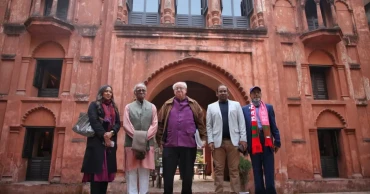archivist and curator
“More than meets the eye”: Dr Kenneth Robbins on Habshi rule in Bengal and Africa-India connection in the Middle Ages
Addressing the fascinating history of the Habshi dynasty in Bengal (from 1487 AD to 1493 AD), prolific international researcher, archivist and curator Dr Kenneth X Robbins on Thursday said that proper archiving of the particular period in South Asia is necessary.
“There are remarkable and important chapters in the Afro-South Asian diaspora including the activities of the African rulers in Bengal and elsewhere in South Asia. There are fascinating stories regarding religion, racism, music and so on. All this history has to be put together by historians,” Dr Robbins said as the honorary speaker at the National Professor Atwar Husain Memorial Lecture 2023, delivered at the Asiatic Society of Bangladesh on Thursday.
He said, “There are stories regarding Habshi rulers and their activities, such as Malik Andil (Sultan Saifuddin Firuz Shah) who was very generous to the people but we don’t actually know what he did. His son succeeded him who was a federal ruler, and the final ruler (Shamsuddin Muzaffar Shah) was also known as a charitable person. We know other stories regarding Africans building mosques in Bengal, bringing their culture here. This is all very interesting…these are important to the history of Bengal.”
He mentioned a book project on the documentation of Bengalis and Africans from the Indian Ocean world — co-edited by Nahar Khan, Executive Director of Cosmos Foundation; Dr Rosie Llewellyn-Jones MBE, a well-known British scholar with expertise on Lucknow and its culture; and himself. The book would contain several chapters on African elites in Bengal, important characters in Bengal, Bengalis abroad, and music featuring names such as American musician Bardu Ali with a Bengali Muslim origin.
Chairperson of National Professor Atwar Husain Trust Fund and Liberation War Museum founder-trustee Mofidul Hoque chaired the seminar.
Read more: ‘Historical and unexplored ties between Afro-South Asian communities need cultural attention’
3 years ago
‘Historical and unexplored ties between Afro-South Asian communities need cultural attention’
Exploring the Afro-South Asia connection and the untold narratives of the Habshi rulers during the Sultanate period in Bengal, globally renowned researcher, archivist and curator Dr Kenneth X Robbins on Tuesday said that the historic ties between the Afro-South Asian communities need to be closely studied across the globe.
“Africans were an integral part of several Indian Sultanates, and some even started their own dynasties after moving to South Asia and eventually settled down here to play an essential role in the Indian subcontinent’s history of kingdoms, conquests and wars. They made contributions to this region’s history as soldiers and mercenaries, traders and merchants, musicians, scholars, and even generals and rulers,” Dr Robbins said.
They flourished as traders, artists, rulers, architects and reformers between the 14th and 17th centuries, and many Bengalis, on the other hand, also settled in Africa. These histories are lesser known, which is why it is necessary to bring global attention to the Afro-South Asian relationship and the Habshi dynasties, according to Dr Robbins who used his collections to publish fourteen books on South Asian history and culture, rooted from his special interests ranging from maharajas, nawabs, and Deccani sultans to minority groups like Afro-South Asians.
Cosmos Foundation, the philanthropic arm of the Cosmos Group, hosted the symposium and exhibition featuring Dr Kenneth X Robbins as part of its Distinguished Speaker Series, titled “Afro-South Asia Connectivity and the Habshi Kingdoms of Bengal and Beyond” on January 3 at the Garden Gallery, Baridhara in Dhaka.
The welcome remarks were delivered by Nahar Khan, Executive Director of Cosmos Foundation, followed by the keynote speech of Dr Robbins, who is currently on a visit to Bangladesh with his wife Joyce Robbins.
Read more: Cosmos Foundation showcases brilliant artworks of Alexandru Poteca and Maksuda Iqbal Nipa
“Many of us have heard of Indians in Africa. However, the movement of people across the Indian Ocean from Africa to India, the fascinating historical exchanges in knowledge, music, arts and culture still remain quite unfamiliar to us. Great lessons can be drawn from the history of how our cultures were shaped by one another, and in many ways still continue to do so. Much thanks to the pioneering work of our distinguished speaker, archivist and scholar Dr Kenneth Robbins in this regard, who has curated several Indian exhibits and many scholarly conferences,” Nahar Khan said in her welcome remarks.
She mentioned that in addition to publishing more than 70 articles, Dr Robbins coedited a three-volume series on Afro-South Asia in the global African diaspora. “These are the most comprehensive accounts of the experiences of the African diaspora in South Asia, which gives us an enthralling insight into the role of Africans in shaping South Asian history, and the interactions between the two communities,” she said.
A voracious collector, Dr Robbins began collecting Rajput, Deccani, Mughal and other paintings from dealers and auction houses in the 1960s. Struck by the fact that only coin collectors knew that Bengal was once ruled by an East African dynasty – from 1486 to 1493, he made it his life’s mission to bring such information into general public discourse.
In October, it was revealed that the Robbins family has designated the Penn Libraries – the library system of the University of Pennsylvania, an IVY League school in the US, as the recipient of their entire collection in their estate planning.
“The generosity of the Robbins family means generations of scholars will find research topics here and use these materials in their teaching – which will bring such information to textbooks in schools and into the general historical discussion. That to me is the meaning and spirit of true scholarship, and I am also happy to announce that we have been working on a book and a film project on Africans in Bengal,” Nahar Khan said.
3 years ago



